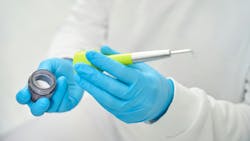Erythritol powder: Its broad implications for oral health
Even if you're not using erythritol powder, glycine is still a fantastic, safe, comfortable powder for use in air-polishing devices designed for low-abrasive powders. This is why some clinicians may elect to stick with glycine. So, why does this new erythritol powder include “plus” in the name? That’s because the potential of erythritol powder extends beyond biofilm and stain removal. Like glycine, erythritol powder obliterates biofilm safely and effectively. But it also has anticariogenic, antibiofilm, and antioxidant properties, and is more efficient in stain and biofilm removal compared to glycine. Additionally, erythritol has antibacterial potential against specific pathogens. So, air polishing first with erythritol powder has the potential for additional benefits over simply removing biofilm and stains.
Basic differences between glycine and erythritol air polishing powders
While glycine is an amino acid that is safe for air polishing, erythritol is a natural, yet noncaloric, sweetener extracted primarily from corn products that is also safe for air polishing. Glycine is 25 microns and erythritol is 14 microns, so erythritol has a smaller particle size and is less abrasive by comparison. Erythritol particles also are 37% harder than glycine, so they are more efficient in stain and biofilm removal than glycine. Nice.
How is erythritol anticariogenic?
Erythritol is similar to xylitol in the oral cavity with regard to cariogenic bacteria. Cariogenic bacteria like Streptococcus mutans cannot metabolize erythritol or xylitol and do not survive well in its presence. An interesting article titled, “Erythritol is more effective than xylitol or sorbitol in managing oral health endpoints,” published in 2016 in the International Journal of Dentistry, reviews numerous studies comparing the anticaries outcomes of erythritol independently and compared to other polyols.1 Not all study designs were comparable, but the data supports erythritol’s robust anticaries impact on the oral cavity. Some studies concluded an even greater anticaries property compared to xylitol.
Erythritol influences biofilm formation
In a 2016 study, four strains of bacteria taken from a peri-implantitis lesion were added to sterile titanium disks until mature biofilm formed, then Air-Flow Plus powder was dissolved in sterile saline solution and added to the biofilm mass. The powder promoted inhibitory effects against the microorganisms and reduced formation of new biofilms because its anti-adherence property.2 Erythritol also has been shown to suppress maturation of gingivitis biofilms in vitro and promote biofilm composition that is more consistent with early colonizers rather than pathogenic species.3 Notable reductions of pathogenic species in biofilms in the presence of erythritol consumption led one author to conclude that erythritol could be used to help prevent periodontal diseases!4
Antioxidant properties of erythritol
Erythritol’s antioxidant properties make it an excellent scavenger of free radicals. Animal studies have shown erythritol neutralizes enough free radicals in diabetic rats to neutralize endothelial dysfunction, and a human pilot study revealed erythritol improved small vessel endothelial function in diabetic patients experiencing hyperglycemic events. In other words, chronic usage essentially reversed the damaging effects of hyperglycemia.5
Crystals of erythritol under a microscope
Erythritol for air polishing
A wide body of evidence exists that confirms the safety, efficacy, efficiency, and comfort of biofilm removal of glycine. But a direct comparison between glycine and erythritol powders, in vitro, concluded that erythritol plus powder possessed greater antimicrobial properties than glycine, positioning it as a valuable alternative to glycine.6 For supportive periodontal therapy patients who present with few calcified deposits, erythritol powder air polishing (EPAP) provides equal results when compared to traditional scaling and root planing, yet is much more efficient and gentle to hard and soft tissues.7 While EPAP does not remove calcified deposits, it is a good alternative to the repetitive and overlapping strokes required by ultrasonic or hand instrumentation for biofilm management around implants and teeth.
If you haven’t switched to low-abrasive air polishing using erythritol powder, now is the time to make the leap. You’ll soon be a born-again air polisher too!
Editor's note: This article was orignally published in 2018 and has been updated as of July 2025.
References
1. de Cock P, Makinen K, Honkala E, Saag M, Kennepohl E, Eapen A. Erythritol is more effective than xylitol and sorbitol in managing oral health endpoints. Int J Dent. 2016;2016:9868421. doi: 10.1155/2016/9868421.
2. Drago L, Bortoli M, Taschieri S, et al. Erythritol/chlorhexidine combination reduces microbial biofilm and prevents its formation on titanium surfaces in vitro. J Oral Pathol Med. 2017;46(8):625-631. doi: 10.1111/jop.12536.
3. Janus MM, Volgenant CMC, Brandt BW, et al. Effect of erythritol on microbial ecology of in vitro gingivitis biofilms. J Oral Microbiol. 2017;9(1):1337477. doi: 10.1080/20002297.2017.1337477.
4. Hashino E, Kuboniwa M, Alghamdi SA, et al. Erythritol alters microstructure and metabolomics profiles of biofilm composed of Streptococcus gordonii and Porphyromonas gingivalis. Mol Oral Microbiol. 2013;28(6):435-51. doi: 10.1111/omi.12037.
5. de Cock P. Erythritol functional roles in oral-systemic health. Adv Dent Res. 2018;29(1):104-109. doi: 10.1177/0022034517736499.
6. Drago L, Del Fabbro M, Bortolin M, Vassena C, De Vecchi E, Taschieri S. Biofilm removal and antimicrobial activity of two different air-polishing powders: An in vitro study. J Periodontol. 2014;85(11):e363-9. doi: 10.1902/jop.2014.140134.
7. Hagi TT, Hofmanner P, Eick S, et al. The effects of erythritol air polishing powder on microbiological and clinical outcomes during supportive periodontal therapy: Six-month results of a randomized controlled clinical trial. Quintessence Int. 2015;46(1):31-41. doi: 10.3290/j.qi.a32817.
About the Author
Karen Davis, BSDH, RDH
Karen Davis, BSDH, RDH, is the founder of Cutting Edge Concepts, an international continuing education company. She practices dental hygiene in Dallas, Texas. She is an independent consultant to the Philips Corporation, Periosciences, Hu-Friedy Group, and EMS. She can be reached at [email protected].


